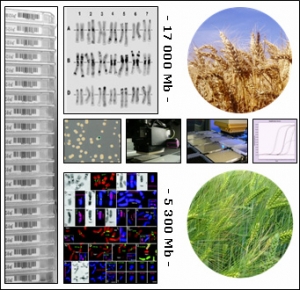TriticeaeGenome : Genomics for Triticeae improvement

Seventh framework programmeFoodAgriculture and Fisheries, Biotechnology
Project Coordinator
Dr. Catherine Feuillet
Institut National de la Recherche Agronomique-ASP
Domaine de Crouelle
234 Avenue du Brezet
63100 Clermont-Ferrand
France
www.clermont.inra.fr/umr-aspE-mail : catherine.feuillet@clermont.inra.fr
Abstract
For many years the size and complexity of the wheat, barley and rye genomes have hampered the development of genomics and its application to produce Triticeae crops with improved composition and characteristics. Recently, however, new and more efficient scientific capabilities and resources have been developed that allows robust genomic programs to be established for the Triticeae.
TriticeaeGenome is designed to achieve significant progresses in Triticeae genomics and support efficient breeding of improved varieties for the European agriculture by:
- Constructing and anchoring physical maps from the wheat and barley group 1 and 3 chromosomes that carry a large number of important agronomic traits (e.g. disease resistance, yield and quality)
- Isolating genes and QTLs underlying disease resistance, yield and quality traits in wheat and barley
- Identifying and exploiting new alleles for the isolated genes through the use of natural and mutant populations as well as wild germplasm
- Supporting the development of new varieties that meet farmer and consumer needs through molecular breeding
- Developing new bioinformatic tools to structure, relate and comprehensively analyse the large scale genomics data gathered within the project
- Leading, coordinating and integrating Triticeae genomics research
Triticeaegenome is developed as a main contribution to the international consortia efforts in constructing physical maps of barley and hexaploid wheat for improving plant breeding, accelerating gene and QTL isolation and setting up the foundation for future genome sequencing.
It will deliver novel information and tools to breeders and scientists for a better understanding of Triticeae genomes organization, evolution, and function thereby, providing a better understanding of the biology of these essential crops and enabling significant improvement of their composition and characteristics to satisfy the needs of consumers, processors and producers.
links :
http://tritigen.ari.gov.cy/
http://www.wheatgenome.org/
http://urgi.versailles.inra.fr/Projects/TriticeaeGenome
CNRGV involvement
Responsible : Arnaud Bellec/ Sonia Vautrin
- Storage of chromosome specific BAC libraries
- Minimum Tilling Path rearrangement
- 3D pools production
Partners
- Institut National de la Recherche Agronomique - INRA - France
- Leibniz Institute of Plant Genetics and Crop Plant Research - IPK - Germany
- Institute of Experimental Botany - IEB - Czech Republic
- GSF- National Research Center for Environment and Health - GSF - Germany
- Università degli Studi di Milano - UMIL - Italy
- University of Haifa - HU - Israel
- MTT (Maa- ja elintarviketalouden tutkimuskeskus) - MTT - Finland
- Scottish Crop Research Institute - SCRI - UK
- Sabanci University - SABA - Turkey
- National Institute of Agricultural Botany - NIAB - UK
- John Innes Centre - JIC - UK
- Universität Zürich - UZH - Switzerland
- INRA Transfert - IT - France
- Biogemma - BGA - France
- Lochow-Petkus GmbH - LP - Germany
- Istituto di Genomica Applicata - IGA - Italy
- University of Bologna -UNBO - Italy

